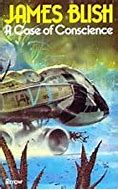Some of Poul Anderson's characters, like Peter Berg and Fr. Axor, address theological issues but in a hard sf context where the text remains neutral between the characters' beliefs. Theology does become an empirical science in some works of fantasy, like Operation Chaos, but there the existence of the supernatural is a fictional premise. We do not believe but suspend disbelief.
Two volumes of James Blish's After Such Knowledge Trilogy are post-Lewis. Philip Pullman's His Dark Materials Trilogy is anti-Lewis. And that is as far as it goes as far as I know. Anyone setting out to continue Lewis' Ransom or Narnia series would have to share, or at least to fully empathise with, Lewis' distinctive blend of Platonic Anglicanism - which seems improbable. Alternatively, Christianity is broad enough to allow its literary proponents to tackle the same fundamental issues from widely different perspectives.

5 comments:
Kaor, Paul!
Have you ever heard of Charles Williams (died 1945), a friend of Lewis? He wrote a series of supernatural novels, one of which, THE PLACE OF THE LION, shows us what might happen if Platonic archetypes literally and physically appeared in our world.
Ad astra! Sean
Sean,
I have read one book by Williams. I can't remember the title. It referred to Islam rather than to Christianity.
Paul.
Kaor, Paul!
You may have MANY DIMENSIONS in mind, focusing on the Stone of Solomon. I particularly recall Lord Chief Justice Arglay, and the discussions about law and justice.
Ad astra! Sean
Sean,
That's it.
Paul.
Kaor, Paul!
MANY DIMENSIONS is one of my favorites among Williams' novels. An elderly jurist like Lord Arglay and his young secretary were interestingly implausible heroes!
Ad astra! Sean
Post a Comment